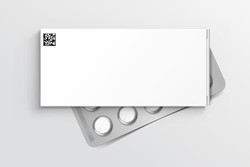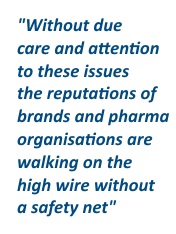Serializing pharma: the true cost of the 1 per cent error
Graham Smith, 09-Feb-2016
 It is a small number isn't it, the number 1? It is a tiny fraction of the overall. Take away 1 per cent and you still have 99 per cent remaining. So why worry about the 1 per cent loss or the 1 per cent that goes wrong? Or the 1 per cent that needs to be checked or investigated a bit further?
It is a small number isn't it, the number 1? It is a tiny fraction of the overall. Take away 1 per cent and you still have 99 per cent remaining. So why worry about the 1 per cent loss or the 1 per cent that goes wrong? Or the 1 per cent that needs to be checked or investigated a bit further?
There are occasions though when 1 per cent amounts to an awful lot. In the pharmaceutical industry 1 per cent can literally make the difference between life and death, or between being a trusted brand or someone the public will never believe again.
The important and fundamental changes coming to the dispensing of medicines in the next few months across Europe mean that the 1 per cent risk of error that manufacturers have worked so hard to eliminate from their production processes, and by extension, their brand image, is back in play. Everything that has been done to build trust and confidence is now uncertain.
If that all sounds a bit over dramatic to you then think about this: the potential cost of the false positive.
For clarification: 'A false positive is an error in some evaluation process in which a condition tested for is mistakenly found to have been detected.'
This is a common fault of security systems that have not been tested sufficiently, are not accurate or do not fully understand the environment and process that they will have to work under.
Consider what happens if the producers of medicines have to investigate false positives on even 1 per cent of the number of packs that they issue. All of a sudden the occasional genuine incident that can be dealt with via recall is multiplied by many thousands as individual packs across one, or even many countries, are not being dispensed. All because of an issue in the authentication process which causes false positive responses. What happens then?
The company might think that the fault lies in the system and not their product but can they be sure? They will have to investigate each incident. That means more staff, delay in dispensing and maybe even the withdraw of the medicine itself for a short period. This costs money and takes up resources. It will also severely harm brand and organisational reputation. What if these events happen regularly? Those costs are going to grow exponentially and very quickly. Across Europe a 1 per cent error rate would represent 100 million returned medicine packs, are manufacturers ready to handle this number?
This is not so far-fetched. The manufacturers of medicines will be at the mercy of a system that they do not control themselves. Authentication at the point of dispenses has to be secure, has to be fast and it has to be reliable and have the confidence of all of those who use it and will rely on it.
 The situation of false positives and others like it will arise. That is why Aegate are advocating that manufacturers fully engage with the choice of the authentication service provider in their country. Our many years of experience of delivering a tried and tested service in Belgium, Italy and Greece has given us insight and understanding that can help national medicine verification organisations (NMVOs) to avoid problems that could hit the confidence of users in their national verification system.
The situation of false positives and others like it will arise. That is why Aegate are advocating that manufacturers fully engage with the choice of the authentication service provider in their country. Our many years of experience of delivering a tried and tested service in Belgium, Italy and Greece has given us insight and understanding that can help national medicine verification organisations (NMVOs) to avoid problems that could hit the confidence of users in their national verification system.
Without due care and attention to these issues the reputations of brands and pharma organisations are walking on the high wire without a safety net. There will not be time in the three year time frame given by the delegated act to experiment, test endlessly and learn all that you need to know before the system in your country has to be fully compliant. Your job is not done just because you have a serialised pack and the tamper proof seal all sorted.
The issue of false positives is just one aspect to consider. The speed of response from the repository will be crucial to ensure that packs are authenticated correctly and of course the overall security of the system which is such an essential and complex area that it needs its own separate discussion.
The number one might be small but it can sometimes come with a big cost if it is not looked after properly.
Graham Smith is a director and chief sales officer of Aegate Ltd.
Related articles:

©
SecuringIndustry.com




 It is a small number isn't it, the number 1? It is a tiny fraction of the overall. Take away 1 per cent and you still have 99 per cent remaining. So why worry about the 1 per cent loss or the 1 per cent that goes wrong? Or the 1 per cent that needs to be checked or investigated a bit further?
It is a small number isn't it, the number 1? It is a tiny fraction of the overall. Take away 1 per cent and you still have 99 per cent remaining. So why worry about the 1 per cent loss or the 1 per cent that goes wrong? Or the 1 per cent that needs to be checked or investigated a bit further? The situation of false positives and others like it will arise. That is why Aegate are advocating that manufacturers fully engage with the choice of the authentication service provider in their country. Our many years of experience of delivering a tried and tested service in Belgium, Italy and Greece has given us insight and understanding that can help national medicine verification organisations (NMVOs) to avoid problems that could hit the confidence of users in their national verification system.
The situation of false positives and others like it will arise. That is why Aegate are advocating that manufacturers fully engage with the choice of the authentication service provider in their country. Our many years of experience of delivering a tried and tested service in Belgium, Italy and Greece has given us insight and understanding that can help national medicine verification organisations (NMVOs) to avoid problems that could hit the confidence of users in their national verification system.